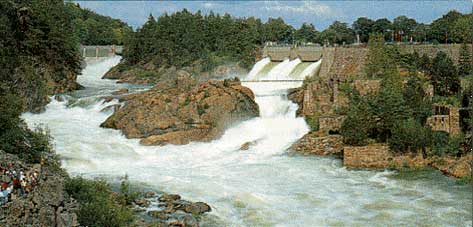
I.
Purpose
The project has two aims:
- to increase our knowledge and understanding of the thoughts and attitudes of young people in the 1990s with respect to energy and environment;
- to analyse in more general terms the position of energy issues in the debate on a paradigm shift.

In order to achieve these aims an in-depth study is carried out on young people's views about the future in a broad sense, strategies as regards production/reproduction, priorities and fears for the future etc. Also see The Nineties Report.
II.
Implementation
The background, purpose and arrangement of the research project were presented in Puranen and Nordlöf, The Nineties Report (1992), which also discussed the theoretical background to values studies. The question was asked whether young people in the nineties are society's least exploited qualified resource.
This study
of young people's views on the environment and energy is part of a much
larger survey which also includes their views on the family/work, technology,
driving forces, culture and the future.  Environmental
issues are an important factor in young people's lives and outlook on
the future. The potential benefits of understanding these processes are
great and the potential drawbacks of failing to understand them are even
greater. We need to find out about the possible options for future environmental
and energy policy. We need to understand young people's lifestyles and
attitudes to work and the family, and also to try to identify the factors
that trigger changes. Therefore, these studies were carried out with the
participation of young people who were specially trained to prepare them
to conduct interviews with a representative sample of peers aged 19-25.
The project was led by Bi Puranen of the Institute for Futures Studies.
The approach used - participatory research - is an established method
in international research, although not so familiar in Sweden.
Environmental
issues are an important factor in young people's lives and outlook on
the future. The potential benefits of understanding these processes are
great and the potential drawbacks of failing to understand them are even
greater. We need to find out about the possible options for future environmental
and energy policy. We need to understand young people's lifestyles and
attitudes to work and the family, and also to try to identify the factors
that trigger changes. Therefore, these studies were carried out with the
participation of young people who were specially trained to prepare them
to conduct interviews with a representative sample of peers aged 19-25.
The project was led by Bi Puranen of the Institute for Futures Studies.
The approach used - participatory research - is an established method
in international research, although not so familiar in Sweden.
The project is now in its third year. Here follows a brief account of the research done so far.
III.
Background
A crucial difference between agrarian and industrial society concerns the role of labour. The farmers' and animals' muscle power was replaced by new energy systems: steam, oil and nuclear power. Electricity is one of the mainstays of the 20th century. But in the paradigm shift that we are now experiencing its viability is being put to the test. People's views on this are largely determined by the value patterns of their generation.
 Many
of those
who belong to the generation of '68 and of those who supported an immediate
ban on nuclear power in the referendum of 1980, are still critical about
the waste of energy in modern society. Young people in the 1990s are environmentally
conscious, but do they share this criticism? Women take up an interesting
stance between the two positions, although we know very little about this.
They are closer to children and young people while at the same time sharing
the views of men of their generation in many matters. They form a link
in the chain men-women-young people-children. A chain is only as strong
as the weakest link. Therefore we need to acquire a better understanding
of the different views in these groups. Are there fundamental differences
in the value patterns that characterize the different generations?
Many
of those
who belong to the generation of '68 and of those who supported an immediate
ban on nuclear power in the referendum of 1980, are still critical about
the waste of energy in modern society. Young people in the 1990s are environmentally
conscious, but do they share this criticism? Women take up an interesting
stance between the two positions, although we know very little about this.
They are closer to children and young people while at the same time sharing
the views of men of their generation in many matters. They form a link
in the chain men-women-young people-children. A chain is only as strong
as the weakest link. Therefore we need to acquire a better understanding
of the different views in these groups. Are there fundamental differences
in the value patterns that characterize the different generations?
One common strategy has been to seek to reduce the need of energy. At the same time, we want a society based on a safe, sustainable and environmentally benign energy supply. How can these needs be reconciled?
Five years ago, a survey was made of Swedish consumers' views on saving electrical energy. The survey indicated that there is a definite correlation between individuals' values and views on electricity-saving. Another conclusion was that many people know very little about how much electricity they consume. On the basis of the typologies used it was established that "knowledgeable" electricity-savers were generally older and male. The average age in all the typologies was about 40.
Five years on it is obvious that the views of the younger generation differ from those of their elders. But we still know too little about these specific views and their likely implications for the future. However some of the results are now available but unfortunately only in Swedish. An English article with some of the results is presented here.
Read more:
- The
Kyoto Protocol
- Bridging
borders
- Elvira
- Figures and Statistics
Print
option:
This page in black and white for printing
©2010 Bi Puranen